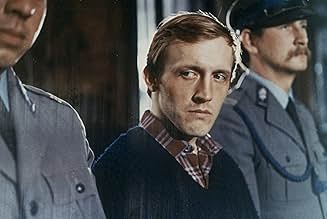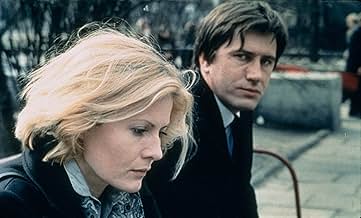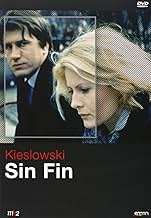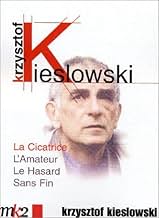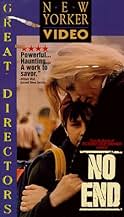IMDb-BEWERTUNG
7,3/10
6066
IHRE BEWERTUNG
Füge eine Handlung in deiner Sprache hinzuThe wife of the recently deceased lawyer tries to cope with grief after his loss and to keep his last case going in court.The wife of the recently deceased lawyer tries to cope with grief after his loss and to keep his last case going in court.The wife of the recently deceased lawyer tries to cope with grief after his loss and to keep his last case going in court.
- Regie
- Drehbuch
- Hauptbesetzung
Danny Webb
- American
- (as Daniel Webb)
Jacek Domanski
- Dzialacz opozycji
- (Nicht genannt)
Empfohlene Bewertungen
I've began to follow Kieslowski over the past days, hoping to finally encounter his color films which I've seen for years pop up among the brilliant works. I watched this as background glimpse into his formative period. Interestingly he does two things:
One is he presents a world that has come undone and carries the past. A woman, her husband has died as the film begins, life has broken down and she has to go out and face it. Everything that she encounters is an echo from the past. Two instances that involve photos exemplify it; nude photos of her that her husband had found but he's now gone before she had a chance to explain, the other shows an idyllic summer that he possibly spent with another woman (before they met?). But also an old friend who now vies for her, a night of prostituting herself because he reminds her of her husband, being hypnotized to forget him conjures his presence, and round it goes from bewilderment to epiphany.
The other thing they do here is look to frame a response to bewilderment felt by Poles who had just been through strikes and martial law. A man is awaiting trial, different narratives are offered up by lawyers. Should he be pragmatic or protest? It's one of the threads that were left undone at the time of the husband's death who was a lawyer on the case. His own advice, which I perceive to be Kieslowski's, is for everyone to remove the distortions that prevent them from seeing each other.
Viewers who are content to encounter a life of episodic confusion will be happy with what he does. I miss a more penetratingly visual way of threading these events and, already from my brief glimpses into Dekalog, I believe it's this ability to surround and submerge causality that he's going to cultivate, a way of dreaming in advance. Here, tellingly, we have the husband announcing his own death in the very first shot whereas it could have been threaded as discovery and glimpsed in a haze (he already tries this by the first episode of Dekalog).
One is he presents a world that has come undone and carries the past. A woman, her husband has died as the film begins, life has broken down and she has to go out and face it. Everything that she encounters is an echo from the past. Two instances that involve photos exemplify it; nude photos of her that her husband had found but he's now gone before she had a chance to explain, the other shows an idyllic summer that he possibly spent with another woman (before they met?). But also an old friend who now vies for her, a night of prostituting herself because he reminds her of her husband, being hypnotized to forget him conjures his presence, and round it goes from bewilderment to epiphany.
The other thing they do here is look to frame a response to bewilderment felt by Poles who had just been through strikes and martial law. A man is awaiting trial, different narratives are offered up by lawyers. Should he be pragmatic or protest? It's one of the threads that were left undone at the time of the husband's death who was a lawyer on the case. His own advice, which I perceive to be Kieslowski's, is for everyone to remove the distortions that prevent them from seeing each other.
Viewers who are content to encounter a life of episodic confusion will be happy with what he does. I miss a more penetratingly visual way of threading these events and, already from my brief glimpses into Dekalog, I believe it's this ability to surround and submerge causality that he's going to cultivate, a way of dreaming in advance. Here, tellingly, we have the husband announcing his own death in the very first shot whereas it could have been threaded as discovery and glimpsed in a haze (he already tries this by the first episode of Dekalog).
...and not much of a middle, either. Beginning's pretty good, though. Is it just me or is TCM Imports, under Alicia Malone, grimly determined to show every single heavy, stolid, dull, depressing film from Mr. Kieslowski? Just one solid, grey, bleak, enervating shroud until I finally cried "wystarczajaco" right around the time Antec's lovely, grieving widow, for reasons best known to Kieslowski and herself, decides to sleep with a random English dude she picks up in a bar. If I were a cynical sort I'd say that the dour Pole had a commercial side to his foreboding personality as I'm sure the sight of Grazyna Szapolowska's luscious bod did not exactly discourage ticket sales. God knows, you need something to quicken the ol pulse as you watch this bloodless bunch, cigarettes stuck firmly in their mugs, stare into the abyss, weep, occasionally crack a bitter joke and stare some more. For awhile, I was hoping that there would be some courtroom drama since the plot seemed to involve a lawyer trying to free a political prisoner. But at the film's halfway mark nary a judge, jury or executioner were to be found. Unless, of course, you see Kieslowski as the hangman of all that is dramatically compelling. C plus.
Grazyna Szapolowska's husband dies. He was a public defender, so she tries to arrange for his last client, Artur Barcis, to have a good defendant. She arranges for Aleksander Bardini, under whom her husband had apprenticed, to take the case. Barcis is accused of having led an illegal strike, and Bardini works to have him tread the middle ground of confessing and denial.
Krzysztof Kieslowski's movie is a murky one that tells us we can never tell what is going on at the moment. Only in retrospect can we figure out what was going on, and even that may not be true. It is a gloomy movie, with a lot of motivation left unclear. Did Miss Szapolowska really love her husband? Why has Bardini, who hasn't taken a case of this sort for more than 30 years, taken this one? What was the strike actually about? That remains uncertain, even after the movie's end.
Krzysztof Kieslowski's movie is a murky one that tells us we can never tell what is going on at the moment. Only in retrospect can we figure out what was going on, and even that may not be true. It is a gloomy movie, with a lot of motivation left unclear. Did Miss Szapolowska really love her husband? Why has Bardini, who hasn't taken a case of this sort for more than 30 years, taken this one? What was the strike actually about? That remains uncertain, even after the movie's end.
Mesmerising, if only for the performance by Grazyna Szapolowska as the widow who moves through the film and ignites every scene. Beautiful and tragic at once she emanates power over the audience and one cannot turn away. I had not realised how much this film must have influenced some established mainstream films that we assume to be original. Obviously many of them owe a great debt to this story. Told unflinchingly by Kieslowski in a unshowy manner it still demonstrates moments of brilliant insights into the human condition. The pain and torture we must endure after such heartache runs through the the heart of this film. I particularly liked the little moments as always, such as the glass slipping through her fingers, the dog trying to get in the car, the dirt on her hands from the bumper whilst witnessing the accident, the hypnotherapy session where she sees him. All simple and yet so elegant. No hammering it through to the audience with big signposting saying 'Remember this for later!'. Why don't more films treat the audience with a tiny bit more intelligence or is the majority of film going to assume we are all thick. And just because a film is mainstream doesn't mean it has to be low brow. Godfather, Deer Hunter, French Connection? Very strong films? If you see this also see Amator.
Krystoff Kieslowski is today best known for his last four films, made wholly or partly in France, which in some ways is a shame, as while these movies are not without merit, they are outshone by the massive brilliance of his earlier, Polish work. Kieslowski was, of course, the greatest visual poet of communist architecture; and there's also something magical about the way he communicates the most intense emotion behind the facade of Slavic stoicism (witness, for example, in this film, the scene where the car is taken by the police). And also there was the subtext of the political beneath the personal, never more apparent than in 'No End', set (and, courageously, made) in the aftermath of the impact of the Solidarity movement on Polish society. In the face of civil unrest, the government had declared martial law, hoping to stave off a "friendly" Russian invasion; but system had lost confidence in itself, and had already effectively negotiated its own demise by the time the collapse of the Berlin wall finally cast it into oblivion. It's in this intermediate period, where normality intermingled with fear, that 'No End' unfolds, a drama that combines moral complexity and human sympathy in equal measure.
The first words of dialgoue in this film are "I died". Billy Wilder had planned to start 'Sunset Boulevard' in a similar manner, but the suits didn't like it and that film makes less sense as a result of the changes they demanded. More recently, films like 'Truly, Madly, Deeply' and 'The Sixth Sense' have repeated one idea explored in 'No End', that of the ongoing relationship between the living and the dead. But whereas both of those films are weighted down by obvious sentimentality, the opening speech in 'No End' is simple, disturbing, painfully real and yet leads naturally into something far more than a ghost story, a tale in which there is no right and wrong, but in which the mixed motives of the characters only illuminate their humanity.
Kieslowski is famous for his collaboration with Zbigniew Priesner, who wrote wonderful scores for this film (and all it's successors); but watching it, one is also struck by how well he used silence. He also had a talent for finding the most wonderfully expressive faces: the lawyer (Aleksander Bardini), the wife (Grazyna Szapolowska) and the client (Artus Barcis) all went on to appear in his 'Dekalog'. It's impossible to imagine a better actor than Bardini for his role; while Szapolowska appears more beautiful than any Hollywood starlet precisely because of the complete lack of glamour with which she is shot; her portrayal of a woman holding things together in the face of an unconquerable grief is wonderful and immensely sad.
There are so many moments of brilliance in this film, almost of all them unflaunted; the moment where the woman's son interrupts her phone call; the tiny flinch induced when a door closes behind her, the way that light floods a previously darkened room; the speech of introduction uttered by the lawyer; Kieslowski constantly finds the subtlest of ways to shed light on his subjects. This is a ten star film, made by a master, grounded in its era but which speaks of so much more. Now released on DVD, it has to be seen.
The first words of dialgoue in this film are "I died". Billy Wilder had planned to start 'Sunset Boulevard' in a similar manner, but the suits didn't like it and that film makes less sense as a result of the changes they demanded. More recently, films like 'Truly, Madly, Deeply' and 'The Sixth Sense' have repeated one idea explored in 'No End', that of the ongoing relationship between the living and the dead. But whereas both of those films are weighted down by obvious sentimentality, the opening speech in 'No End' is simple, disturbing, painfully real and yet leads naturally into something far more than a ghost story, a tale in which there is no right and wrong, but in which the mixed motives of the characters only illuminate their humanity.
Kieslowski is famous for his collaboration with Zbigniew Priesner, who wrote wonderful scores for this film (and all it's successors); but watching it, one is also struck by how well he used silence. He also had a talent for finding the most wonderfully expressive faces: the lawyer (Aleksander Bardini), the wife (Grazyna Szapolowska) and the client (Artus Barcis) all went on to appear in his 'Dekalog'. It's impossible to imagine a better actor than Bardini for his role; while Szapolowska appears more beautiful than any Hollywood starlet precisely because of the complete lack of glamour with which she is shot; her portrayal of a woman holding things together in the face of an unconquerable grief is wonderful and immensely sad.
There are so many moments of brilliance in this film, almost of all them unflaunted; the moment where the woman's son interrupts her phone call; the tiny flinch induced when a door closes behind her, the way that light floods a previously darkened room; the speech of introduction uttered by the lawyer; Kieslowski constantly finds the subtlest of ways to shed light on his subjects. This is a ten star film, made by a master, grounded in its era but which speaks of so much more. Now released on DVD, it has to be seen.
Wusstest du schon
- WissenswertesThe film takes place in 1982.
- Zitate
[First lines]
Antek Zyro: [speaking directly to the camera] I died - four days ago.
Top-Auswahl
Melde dich zum Bewerten an und greife auf die Watchlist für personalisierte Empfehlungen zu.
- How long is No End?Powered by Alexa
Details
Zu dieser Seite beitragen
Bearbeitung vorschlagen oder fehlenden Inhalt hinzufügen


